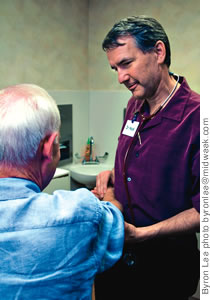
Caring For Our Aging Population
June 03, 2009
By Dr. John Houk


Dr. John Houk
Medical director of Arcadia Retirement Residence
Interviewed By Melissa Moniz
Where did you receive your training?
I attended Beloit College in Wisconsin, where I met my future wife, Jane Chock, a McKinley High School graduate. I graduated from the Abraham Lincoln School of Medicine at the University of Illinois. My internship and residency in internal medicine were in Dallas at the University of Texas Southwestern.
Describe your job experiences?
I came to Hawaii in 1980. My first position was at the Fronk Clinic-Pearlridge. It was adjacent to the old Leeward Hospital where Pali Momi is now located. I moved to the Fronk Clinic on Beretania Street in 1982. I’ve been in solo private practice of general internal medicine since 1988. My office is located at the Queen’s Physician’s Office Building 2. I was appointed medical director of Arcadia 18 years ago.
{embed=“elements/box_ad”}
With Arcadia being one of Hawaii’s largest senior home-care facilities, can you talk about the staff needed to ensure that the residents receive the proper level of care?
Arcadia is like a hospital in some ways. We never shut down; there has to be people physically here who are able to provide the care seven days a week, 24 hours a day. We have about the same number of staff as we have residents. We have administrative, dining, housekeeping and nursing staff. In my view, the key staff person is the certified nurse assistant who provide most of the one-on-one care to our residents.
There’s a continuum of care here at Arcadia. When most folks move into Arcadia, they are fully independent. As you age and need more services, Arcadia provides them, such as medication management, shopping and personal care. If Arcadia is unable to meet your needs in your apartment, residents move to our health care center, where there is a registered nurse and additional staff on duty 24/7.
About how much of your time is spent at Arcadia and how much with your private practice?
I’m physically here at Arcadia each Tuesday afternoon. I am in telephone or fax contact on a daily basis. I’m often here another one or two times a week for drop-in visits. The rest of my time is spent in my private practice. I am also an assistant clinical professor at the John A. Burns School of Medicine, where I teach medical students and residents in internal medicine.

|
How do both occupations overlap?
There’s a tremendous amount of overlap. I’m not a board-certified geriatrician, but I have a geriatric practice. Many of my patients are over 80. So I must handle many age-related issues both at Arcadia and in my solo practice.
Was your practice always focused on geriatrics, or did it evolve over the years?
Virtually every internal medicine practice becomes a geriatric practice with time. Many of our patients will come to us when they are young. As the practice ages, so do the patients. So almost every internist eventually gathers a large number of geriatric patients. It is just the nature of the job.
What are the most common health problems that you see afflicting the elderly population?
In medical school, we are taught to diagnose disease and treat. In geriatrics, we concentrate more on quality-of-life issues. What is the functional state of the patient? What are the patient’s goals? Frequently my Arcadia patients are more interested in quality than quantity. I ask about common geriatric conditions, such as balance problems, insomnia, loss of weight, isolation, visual, hearing or bladder problems. A fall associated with an injury is often the beginning of the end for a geriatric patient. So I spend time assessing a person’s risk of falling, trying to correct foot, balance or visual problems that may contribute to a significant fall.
Can you talk about the mental and physical problems that arise with age, and if one of the two tends to go first?
Decline in mental status and decline in physical status often go hand-in-hand. If we make it to 90 years old, over half of us will suffer from some form of dementia as well as arthritis and various other degenerative problems. So some cognitive decline is often our companion as we age, just as arthritis and heart disease often accompanies us. That is frightening to many of us, but it’s true.
{embed=“elements/google_ad336x280”}
Are there any problems you see that are on the rise?
We’re all living longer, so because we are living longer, all the age-related health problems I mentioned are becoming more prevalent. The baby boomers are coming, and there is this huge wave of folks who are getting older who will have these problems.
With that said, can you talk about how much strain is put on a family trying to take care of their parents and grandparents, and also how Arcadia helps alleviate that?
Many of the current folks living at Arcadia took care of their aging parents. Many moved to Arcadia in order to spare their children this responsibility. At Arcadia, there is professional staff to provide this care. It is interesting to speculate on what is in store for the future. There are not enough Arcadias to take care of the large number of baby boomers who are coming. Arcadia is already making plans for how to take care of the next generation outside of an institutional setting. Many predict that we are going to see family members again giving care to their aging parents. Arcadia is preparing to provide services to the families to support them as they care for their aging baby-boomer family member at home.
What advice would you offer to the younger generation to keep healthy for years to come?
Stay skinny, exercise and avoid bad habits like cigarette smoking, alcohol and drugs. Maintaining stable, loving relationships with family and friends is another key to staying healthy.